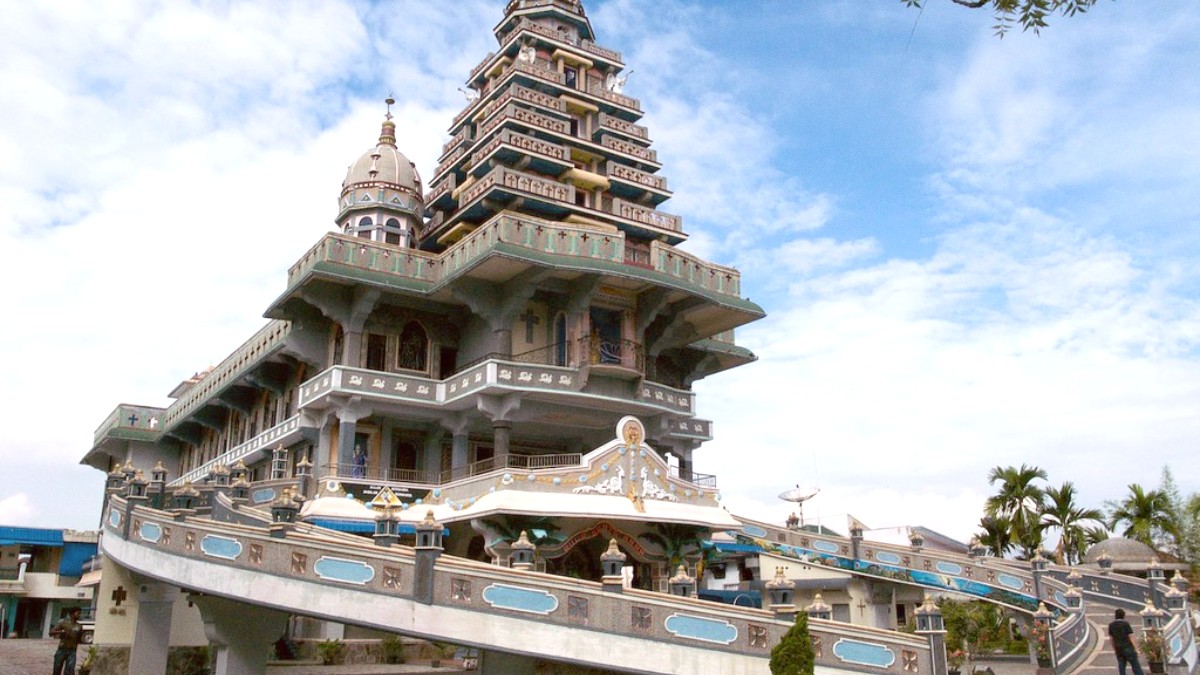
Sumatra, Indonesia
Medan's cuisine is a fusion, with flavors telling the city's story of past migration from across Indonesia and beyond. Influences stem mainly from Chinese, Batak, Javanese, and Indian traditions, resulting in a complex culinary identity.
Medanese cuisine features a broad palette of ingredients and flavors. Common elements include fresh seafood, various meats, rice, and noodles. A wide array of spices like chili, lemongrass, ginger, and turmeric create depth. Coconut milk appears frequently in curries and desserts. Flavors range from spicy and savory to sweet and tangy. Batak pepper ("andaliman") provides an unique numbing and citrusy sensation, distinguishing some dishes.
In many local eateries, especially for Malay or Indian food, eating with your right hand is common. Utensils (spoon and fork) are almost always provided if preferred. The left hand is generally considered unclean.
Dishes are often shared among diners, specifically at larger family meals. Order several dishes to experience a wider range of flavors. Tipping is not customary in local eateries or warungs. In more upscale restaurants, a service charge (often 5-10%) may already appear on your bill.
Breakfast is often light. Lunch typically is the main meal. Dinner is generally from 7 PM to 9 PM, with street food stalls open much later. Snacking occurs frequently throughout the day.
Often called "Batak spaghetti," this thick noodle dish features a rich, spicy, and savory sauce, served with boiled eggs and crackers. Look for it in Batak eateries.
A distinct flavor from andaliman often distinguishes it.
A rich, yellowish coconut milk soup, typically with chicken or beef, served with melinjo nut crackers and rice. This comforting and flavorful dish is widely available.
A flavorful and comforting local staple.
This Karo Batak specialty presents roasted pork, known for its crispy skin and tender meat, served with a distinct chili sauce and sometimes an unique blood sauce. Find BPK at specific Batak (Karo) restaurants.
A unique and popular Batak culinary experience.
Es Teh Manis (sweet iced tea), fresh fruit juices (Jus alpukat - avocado juice with chocolate syrup), and Kopi Susu (coffee with condensed milk) are popular non-alcoholic choices. Bintang (local beer) and local rice wine (Tuak) are alcoholic options, though tuak is less common in the city center.
Bika Ambon (a spongy, sweet cake originating in Medan), Pancake Durian (thin crepes filled with durian cream), Kue Lapis (layered cake), and various Gorengan (fried snacks like tempeh, tofu, bananas) are widely available.
While limited, Medan's fine dining scene has growth. Some upscale hotels house restaurants offering Indonesian and international cuisine.
These are abundant, presenting a mix of Indonesian, Chinese, Malay, and Western dishes. Many specialized restaurants focus on specific regional cuisines.
Warungs (small, local eateries) offer inexpensive Indonesian staples. Merdeka Walk, Jalan Selat Panjang, and Jalan Semarang are famous for street food.
A traditional market hosting numerous food stalls, offering a lively and authentic atmosphere for food exploration. You will find a diverse selection of local snacks and dishes.
Offers a glimpse into daily local commerce.
These markets provide fresh produce, spices, and local snacks. They serve as great places to experience the local food culture and find unique ingredients.
Excellent for fresh, local ingredients.
Widely available in malls.
Korean, Japanese, and other Asian restaurants.
European-style fare available.
Mostly in shopping malls or upscale neighborhoods.
Most Indonesian food stalls and restaurants are Halal, adhering to Islamic dietary laws. Look for "Halal" signs.
Widely available across Medan.
Kosher food is extremely rare and generally unavailable in Medan. Travelers needing Kosher food should plan to bring their own or rely on widely available vegetarian or vegan options.
Not commonly found.
Learning Indonesian phrases like "tidak pakai daging" (no meat), "tidak pakai ayam" (no chicken), "tidak pakai ikan" (no fish), and "tidak pakai terasi" (no shrimp paste) is very useful.
Prepare a small card in Indonesian explaining your dietary needs to show restaurant staff, specifically for complex allergies.
Some local tour operators or guesthouses may present informal cooking classes, focusing on regional Indonesian or Batak cuisine. These allow a hands-on experience and insight into local ingredients.
Guided food tours, often walking tours, present an excellent way to explore Medan's street food scene and introduce local specialties.
Within Medan city, farm visits are not common. Opportunities might exist in surrounding agricultural areas or during day trips to Berastagi, visiting fruit and vegetable farms.
Approach street food with a discerning eye. Choose stalls with a high turnover of customers and where food appears cooked fresh in front of you.
Freshly cooked food is generally safer.
Don't hesitate to ask locals for their recommendations for the best hidden food spots. They often guide you to authentic culinary experiences.
Local advice offers the best experiences.
When uncertain about dining etiquette, observe how locals dine and follow their lead.
Basic Indonesian phrases make ordering easier and show respect for local culture.
Medan's climate warrants frequent water intake, especially when exploring food stalls.
Exploring Medan's markets presents a sensory adventure. Engage with vendors and try samples where offered to truly taste the city.